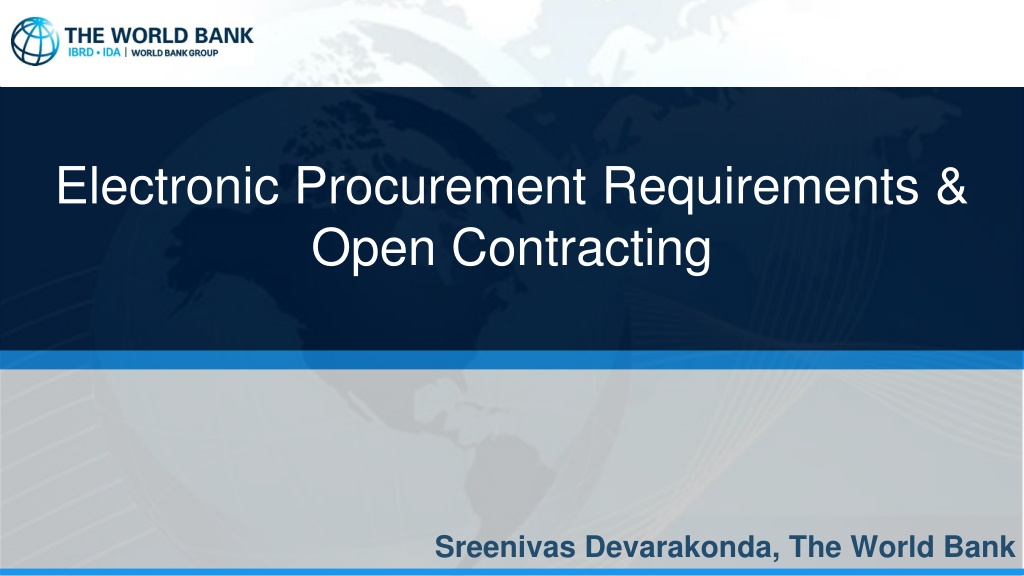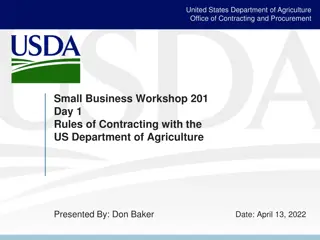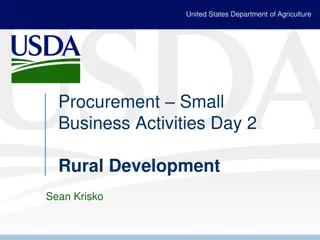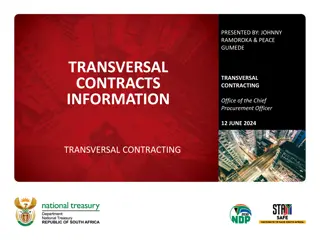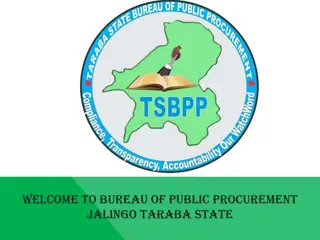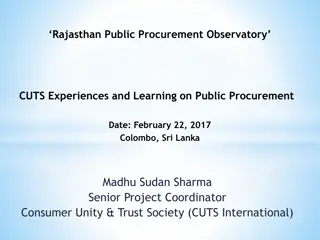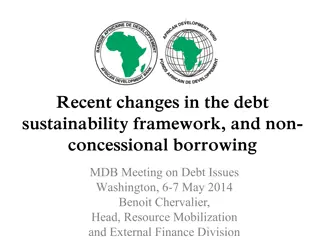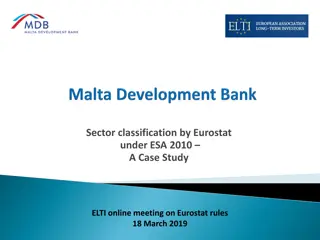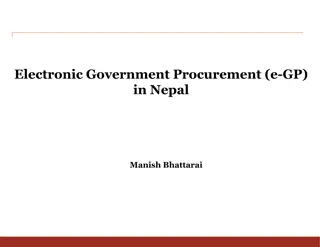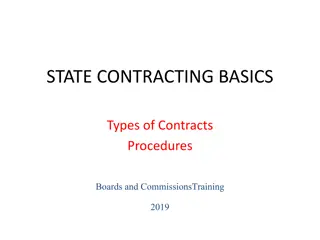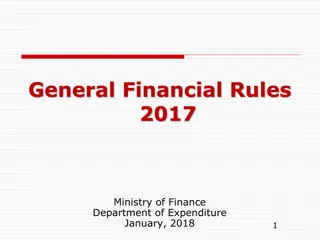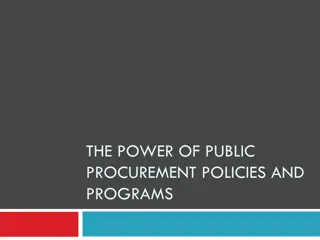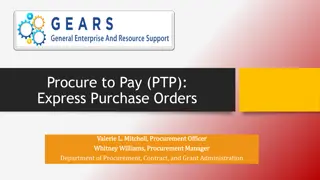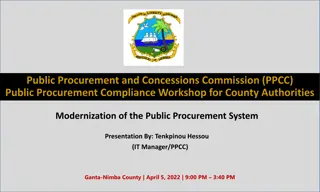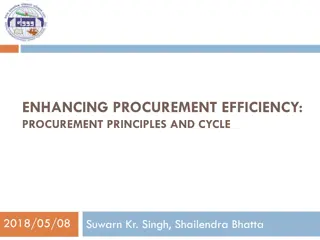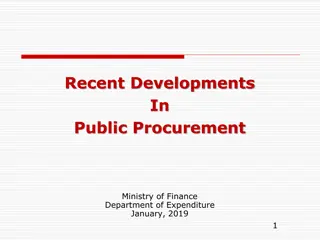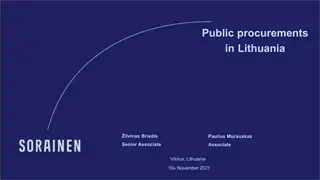Guidelines for Electronic Procurement and Open Contracting in MDB Operations
Promoting the use of e-Procurement systems in MDB-financed activities, emphasizing open standards and key principles such as transparency and accountability. Requirements include technical standards, neutrality, and security measures. Detailed e-GP requirements and guidelines focus on system access, advertising, and document integrity. Encouraging sovereign governments to implement electronic procurement while ensuring economy, efficiency, and competition.
Uploaded on Sep 23, 2024 | 0 Views
Download Presentation

Please find below an Image/Link to download the presentation.
The content on the website is provided AS IS for your information and personal use only. It may not be sold, licensed, or shared on other websites without obtaining consent from the author. Download presentation by click this link. If you encounter any issues during the download, it is possible that the publisher has removed the file from their server.
E N D
Presentation Transcript
Electronic Procurement Requirements & Open Contracting Sreenivas Devarakonda, The World Bank
Use of e-Procurement Systems The World Bank encourage use of electronic procurement systems as means for processing and managing activities funded by them Encourage use of end-to-end e- Procurement systems starting from procurement planning, evaluation, award of contract and contract management. It is desirable that the system is based on open standards so additional functionalities can be added over time. Encourage sovereign governments to find their own paths in its implementation, however some minimum standards and qualities must be met if such electronic systems are to be applied to the activities that they fund May include several modules such as e-Bidding, e-Catalogues, e-Reverse Auctions, e-Framework Agreements, and Procurement Management Information Systems (PMIS).
Electronic Procurement Requirements for MDB Financed Operations
Key Principles of MDB Guidelines Economy and efficiency Transparency Non-discrimination Equality of access Security of process Open Competition Accountability
Broad Standards to be met Technical standards for interoperability with other existing systems Technological/ Brand neutrality Cost and ease of participation Ensuring good audit trails Security
e-GP Requirements Correspondence, Amendments & Clarifications System Access Procurement Documents Advertising Bid Evaluation and Contract Award Submission of Bids/Proposals Bid Securities Information Security Management Public Bid Opening Authentication Payment
MDB Guidelines on e-GP Assessment System Access Advertising Procurement Documents Open, equal, unrestricted Single sign-on Available on commonly used browser software Documents readable through commonly used office software Advertisement shall be posted on a publicly accessible web site that is well known nationally, well maintained, functional, and affords free and unrestricted access Ensure the integrity of issued Procurement Documents and amendments in commonly used electronic, and their online publication.
MDB Guidelines on e-GP Assessment Correspondence, Amendments & Clarifications Posted onto the website of the associated Procurement Document. Correspondence during bid evaluation may also be done electronically. Confidentiality of the bid evaluation process shall be maintained. All correspondence and amendments shall be recorded for audit. Systems shall ensure that only authorized changes can be made. Submission of Bids/Proposals Bid Securities By filling in online procurement forms and/or uploading documents through a secured website. System to ensure confidentiality & integrity of bids and as secure log of the processes shall be available for audit as required Bids submitted online shall be virus scanned before being uploaded and accepted into the online bid box Receipt of electronic submissions, including the date and time, must be acknowledged by the system immediately. Electronic Bid securities are acceptable as long as they do not discriminate any bidder. Use of bid/proposal securing declaration is preferable
MDB Guidelines on e-GP Assessment Bid Evaluation and Contract Award Use pre-approved automated evaluation processes so long as the evaluation aligns with the criteria established in the procurement documents. BERs shall be in the electronic format. Contract awards shall be published online Authentication Public Bid Opening Electronic bids should be opened online at the specified bid opening time Minutes of bid opening stating the name of all bidders and bid prices shall be uploaded on the portal Bids in electronic format shall be confidential and accessible only to authorized persons until the publication of the contract award. Requirements of DSC Participation of Foreign bidders: shall allow bidders to take all actions required for their certification within their own countries, without the need to travel abroad.
MDB Guidelines on e-GP Assessment Information Security Management (ISM) Payment Develop, maintain and implement an ISM that conforms with international standards. No outstanding audit issues that represent material risk to the integrity or security of any project Procedures to be followed in the case of any failure, malfunction, or breakdown of the electronic system used during the procurement process Secure records are kept of every process, transmission, receipt, transaction in terms of the content, executing individual and authorizations, time and date. Open and free access to all Specific Procurement Notices (SPNs). No payment to be charged. Fees to be charged for participation should be reasonable and encourage effective competition. Bidders should be offered an electronic payment facility to avoid situations to visit an office to pay for them
Open Data & Open Contracting A transformational approach to improve transparency in public contracting Open data is data that can be freely used, shared and built-on by anyone, anywhere, for any purpose by applying an appropriate open license Open contracting is about publishing and using open, accessible and timely information on government contracting to engage citizens and businesses in identifying and fixing problems
Open Data & Open Contracting Why open data & open contracting? Different groups of people and organizations can benefit including government itself It s impossible to predict precisely how and where value will be created in the future Nature of innovation is that developments often comes from unlikely places Areas where open government data is creating value Transparency and democratic control Participation and Self-empowerment Improved or new private products and services Innovation Improved efficiency and effectiveness of government services Impact measurement of policies New knowledge from combined data sources and patterns in large data volumes
Open Contracting Data Standards Technology tools and services can use the information easily and reliably Allows the publisher to focus on content, completeness, and quality lowers the cost of producing, using, comparing, and integrating data standardized data can be compared globally and analyzed more easily guidance on both what to publish and how to publish at each stage of contracting process Why Data Standards? Title helps governments deliver better value for money, increase competition and better track service delivery ready-made approach to share data effectively
Open Contracting Data Standards (OCDS) Disclosure of contract information and data creates opportunities for stakeholder participation for effective use of information and data in the monitoring and oversight of contract management and to advance mechanisms for constructive multi-stakeholder engagement Achieve value for money in procurement Competing for public contracts Monitoring Service Delivery Detecting fraud and corruption Helps to get good value for money on procurement process, Helps in identifying the value for money has been achieved Analyzing trends in prices and supplier performance. Used to track contracting opportunities Can make information available at the early stages of a contracting process All stakeholders have an interest in identifying and combating corruption in public contracting. red flags that might indicate public monies being misused Users want to ensure that public contracting is delivering value to citizens in terms of quality and timeliness It also link budgets and donor data to the contracts and results
Open Contracting Unlock innovation Save governments money and time Determine fraud and corruption Improve service delivery to citizen Level playing field for business, Smarter analysis and better solutions more SMEs Benefits
